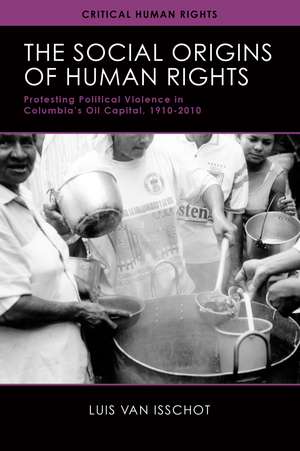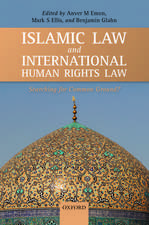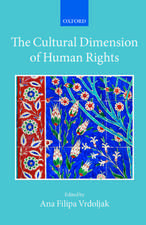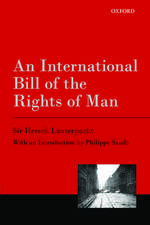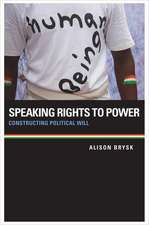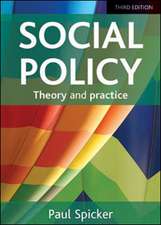The Social Origins of Human Rights: Protesting Political Violence in Colombia’s Oil Capital, 1919–2010: Critical Human Rights
Autor Luis van Isschoten Limba Engleză Paperback – iun 2015
Human rights activism is often associated with international organizations that try to affect the behavior of abusive states around the globe. In Barrancabermeja, Colombia, argues Luis van Isschot in The Social Origin of Human Rights, the struggle for rights has emerged more organically and locally, out of a long history of civil and social organizing. He offers deep insight into the lives of home-grown activists in a conflict zone, against the backdrop of major historical changes that shaped Latin America in the twentieth century.
Built by Standard Oil in 1919, and home to the largest petroleum refinery in the country, Barrancabermeja has long been a critical battleground in Colombia’s armed conflict. One of the most militarized urban areas on earth, the city has been a regional base for the Colombian armed forces as well as for leftist guerrillas and a national paramilitary movement. In the midst of a dirty war in which the majority of victims were civilians, urban and rural social movements from Barrancabermeja and the surrounding area came together to establish a human rights movement. These frontline activists called upon the Colombian state to protect basic human rights and denounced the deeper socioeconomic inequalities they saw as sources of conflict. Through close study of the complex dynamics at work in Barrancabermeja, van Isschot shows how the efforts we describe as “human rights” activism derive in large part from these lived experiences of authoritarianism, war, poverty, and social exclusion. Through its social and historical approach, his analysis both complements and challenges the work of scholars who look at rights issues primarily through a legal lens.
Built by Standard Oil in 1919, and home to the largest petroleum refinery in the country, Barrancabermeja has long been a critical battleground in Colombia’s armed conflict. One of the most militarized urban areas on earth, the city has been a regional base for the Colombian armed forces as well as for leftist guerrillas and a national paramilitary movement. In the midst of a dirty war in which the majority of victims were civilians, urban and rural social movements from Barrancabermeja and the surrounding area came together to establish a human rights movement. These frontline activists called upon the Colombian state to protect basic human rights and denounced the deeper socioeconomic inequalities they saw as sources of conflict. Through close study of the complex dynamics at work in Barrancabermeja, van Isschot shows how the efforts we describe as “human rights” activism derive in large part from these lived experiences of authoritarianism, war, poverty, and social exclusion. Through its social and historical approach, his analysis both complements and challenges the work of scholars who look at rights issues primarily through a legal lens.
Din seria Critical Human Rights
-
 Preț: 167.81 lei
Preț: 167.81 lei -
 Preț: 171.14 lei
Preț: 171.14 lei -
 Preț: 257.44 lei
Preț: 257.44 lei -
 Preț: 234.39 lei
Preț: 234.39 lei -
 Preț: 159.02 lei
Preț: 159.02 lei -
 Preț: 201.83 lei
Preț: 201.83 lei -
 Preț: 233.54 lei
Preț: 233.54 lei -
 Preț: 189.98 lei
Preț: 189.98 lei -
 Preț: 311.92 lei
Preț: 311.92 lei -
 Preț: 225.80 lei
Preț: 225.80 lei -
 Preț: 258.01 lei
Preț: 258.01 lei - 23%
 Preț: 473.27 lei
Preț: 473.27 lei -
 Preț: 179.28 lei
Preț: 179.28 lei -
 Preț: 176.61 lei
Preț: 176.61 lei -
 Preț: 177.37 lei
Preț: 177.37 lei -
 Preț: 235.39 lei
Preț: 235.39 lei - 23%
 Preț: 452.84 lei
Preț: 452.84 lei -
 Preț: 221.81 lei
Preț: 221.81 lei -
 Preț: 213.29 lei
Preț: 213.29 lei -
 Preț: 237.55 lei
Preț: 237.55 lei -
 Preț: 231.15 lei
Preț: 231.15 lei - 23%
 Preț: 472.22 lei
Preț: 472.22 lei -
 Preț: 180.25 lei
Preț: 180.25 lei -
 Preț: 510.83 lei
Preț: 510.83 lei - 23%
 Preț: 474.01 lei
Preț: 474.01 lei - 23%
 Preț: 473.72 lei
Preț: 473.72 lei - 23%
 Preț: 590.00 lei
Preț: 590.00 lei - 23%
 Preț: 477.70 lei
Preț: 477.70 lei - 23%
 Preț: 472.37 lei
Preț: 472.37 lei - 11%
 Preț: 230.06 lei
Preț: 230.06 lei - 13%
 Preț: 200.36 lei
Preț: 200.36 lei - 19%
 Preț: 437.91 lei
Preț: 437.91 lei
Preț: 254.11 lei
Nou
Puncte Express: 381
Preț estimativ în valută:
48.63€ • 50.46$ • 40.65£
48.63€ • 50.46$ • 40.65£
Carte tipărită la comandă
Livrare economică 15-29 martie
Preluare comenzi: 021 569.72.76
Specificații
ISBN-13: 9780299299842
ISBN-10: 0299299848
Pagini: 328
Ilustrații: 10 b-w photos, 4 maps
Dimensiuni: 152 x 229 x 20 mm
Greutate: 0.43 kg
Ediția:1
Editura: University of Wisconsin Press
Colecția University of Wisconsin Press
Seria Critical Human Rights
ISBN-10: 0299299848
Pagini: 328
Ilustrații: 10 b-w photos, 4 maps
Dimensiuni: 152 x 229 x 20 mm
Greutate: 0.43 kg
Ediția:1
Editura: University of Wisconsin Press
Colecția University of Wisconsin Press
Seria Critical Human Rights
Recenzii
“A major contribution to scholarship on Colombian violence and human rights, and a substantial contribution to the historiography on human rights more generally.”—Nancy Appelbaum, Binghamton University
“A nuanced history of human rights organizing in one of the most contentious and violent cities in Colombia, documenting the deep roots of such activism in the social struggles of the past century. Luis van Isschot illuminates the critical role human rights organizations play in making violence known, and more importantly, analyzing the causes and consequences of such violence. Essential reading for anyone concerned with Colombia’s past and present.”—Winifred Tate, Colby College
“What truly distinguishes van Isschot’s work from other scholarly work on human rights activism in Latin America is the emphasis on the local level and the exploration of the state’s dual role of systematizing human rights while also undermining them.”—Choice
Notă biografică
Luis van Isschot is an assistant professor of the history of modern Latin America at the University of Toronto. He has worked and conducted research in Latin America, Canada, the United States, and the Great Lakes region of Africa. From 1995 to 2005, he worked for Peace Brigades International (PBI), which provides unarmed protective accompaniment to human rights and social activists in conflict areas.
Cuprins
List of Illustrations
Preface
Chronology of Barrancabermeja History
Introduction: "My basic training took place in the street"
1 Oil Workers, Colonos, and the Roots of Popular Radicalism
2 New Social Movements Come Forward
3 War in the Countryside and the Transformation of a Company Town
4 Popular Protest and Human Rights Activism
5 Biography of a Human Rights Movement
6 The Backlash against Human Rights
7 Social Movements Respond to Catastrophic Change
Conclusion: "This utopia, this chance to continue dreaming"
Notes
References
Index
Preface
Chronology of Barrancabermeja History
Introduction: "My basic training took place in the street"
1 Oil Workers, Colonos, and the Roots of Popular Radicalism
2 New Social Movements Come Forward
3 War in the Countryside and the Transformation of a Company Town
4 Popular Protest and Human Rights Activism
5 Biography of a Human Rights Movement
6 The Backlash against Human Rights
7 Social Movements Respond to Catastrophic Change
Conclusion: "This utopia, this chance to continue dreaming"
Notes
References
Index
Descriere
Offering deep insight to the lives of human rights activists in a conflict zone, against the backdrop of major historical changes that shaped Latin America in the twentieth century, this book illuminates the critical role of human rights organizations in bringing violence to public attention and analyzing its causes and consequences.
